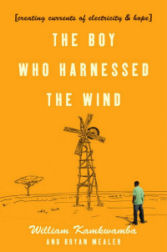 The Boy Who Harnessed the Wind: Creating Currents of Electricity and Hope, by William Kamkwamba and Bryan Mealer
The Boy Who Harnessed the Wind: Creating Currents of Electricity and Hope, by William Kamkwamba and Bryan Mealer
Several months ago a marketing director at HarperCollins read one of my book reviews. She contacted me to ask if I would read and review an advance copy of The Boy Who Harnessed the Wind, and of course I said yes. By the time it arrived, only the most rabid Pollyanna could call it an “advance copy” — the book had been on the shelves for several weeks, and the author, William Kamkwamba, had already made the rounds of television and radio talk shows in the USA and UK.
But hey . . . a free book is a free book, and a good free book is more precious still. For all the publicity The Boy Who Harnessed the Wind has already received, I suspect most readers have not heard of it, and if my tardy amateur review will help bring it to their attention, they hey for tardy amateur reviews!
The review that caught the marketing director’s eye was one I’d written on Three Cups of Tea, Greg Mortenson’s inspirational story of building village schools in remote tribal areas of Pakistan. The Boy Who Harnessed the Wind is William Kamkwamba’s inspirational story of growing up in a small village in Malawi and making life better by building an electricity-generating windmill.
As much as I loved Greg Mortenson’s story, it’s told from the point of view of an educated, advantaged citizen of a First World country going to bat for uneducated, disadvantaged tribesmen in a remote Third World area. Greg is appalled at the lack of schools in the Himalayan region of Pakistan and decides to help the impoverished locals. Do the impoverished locals really want his help? Do they appreciate it, and has it made a difference? Greg says so, and we have no choice but to believe him . . . we don’t get to hear from the locals because everything in Three Cups of Tea is filtered through Greg Mortenson’s Western eyes.
What’s so refreshing and new about William Kamkwamba’s story is that it’s told through African eyes. The words, co-written with Bryan Mealer, are William’s. The thoughts, feelings, disappointments, struggles, hopes, dreams, and triumphs — all are William’s.
William Kamkwamba tells — without Western interpretation or preconceptions — of life in a Malawian village. Conditions that would appall a Westerner are daily facts of life to William. Along with other members of his tribe, he starves during times of famine. He lives without electricity, his education is hit-and-miss (and during the famine years, mostly miss). The corrupt, ineffective government of Malawi provides nothing; the people expect nothing. Cops, fire departments, social services, retirement? Not. And yet William loves his country, his life, his fellow villagers, his family and friends. He hopes for a good future . . . as a Malawian.
As a young boy William is curious about, and interested in, electricity. He studies bicycle dynamos and figures out how they work. He disassembles transistor radios and figures out how they work. He teaches himself the difference between direct and alternating current. And then he sees a photograph of a windmill in a library book and goes to work making a better future for himself and his village.
During an extended period when he is unable to go to school because his family cannot pay for his education, he builds a windmill from scrap wood and plastic, a tractor fan from a junkyard, and a bicycle wheel. His windmill drives a small bicycle dynamo, which he uses to power lights in his house and to recharge villagers’ cell phones (oddly, one modern convenience Malawian villagers do have).
William is brilliant, determined, brave — especially when his fellow villagers turn on him during another famine, claiming he is a witch — and in time he convinces his fellow villagers that he’s onto something, that they too can benefit from “electric wind.”
In time William and his windmills come to the attention of the outside world and the rest is history. If, like me, you sometimes wonder if mankind could screw things up any more than we have already, pick up a copy of The Boy Who Harnessed the Wind and recharge your batteries with this wonderful, inspiring, uplifting true story.